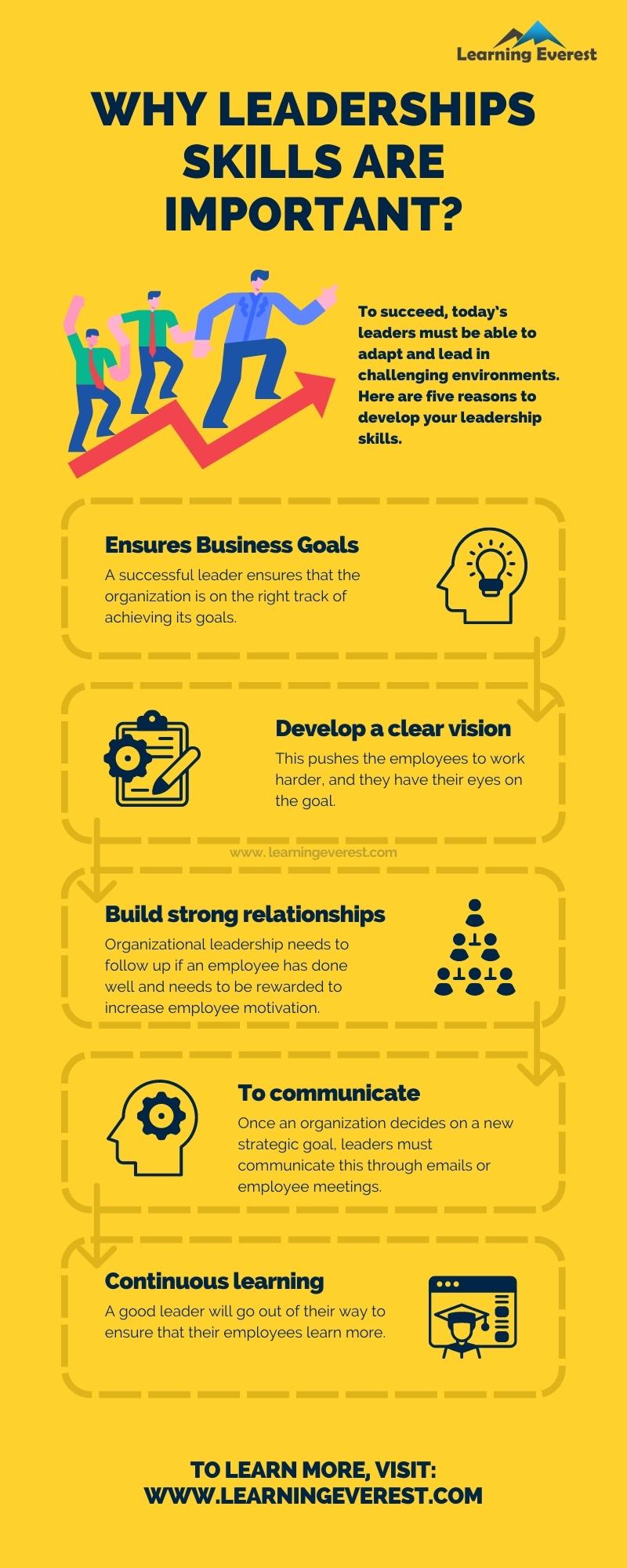It does not matter if you are running non-profit organizations (NGOs), a branch of government, or a for-profit enterprise: one will always need a vision for your team's future. You will also need leaders to execute your organizational goal successfully. From motivating others to cooperate in completing tasks to determining what tasks are important in the first place, leadership is essential to the business. In this blog, we will look at the importance of having leadership skills in business and how leadership in business administration can be a valuable skill at all levels of an organization.
Table of Contents
- Here are the 7 Reasons Why Leadership Skills Are Essential in Corporate
- Why is Leadership Important in Business?
- Infographic
- Knowledge Check!
- Frequently Asked Questions (FAQs)
- What are leadership skills, and why are they important in the corporate world?
- Can leadership skills be learned and developed?
- How do leadership skills benefit an organization’s goals?
Here are the 7 Reasons Why Leadership Skills Are Essential in Corporate
Leadership qualities
Four essential leadership skills include:
Leading by example: One of the best ways to inspire your team is to practice what you preach. People want accountability from their leaders.
Strong communication skills: Written and verbal communication skills can be essential to leadership. Cognitive empathy is the ability to put yourself in another team member’s shoes, which can be particularly important for becoming a good communicator and connecting with those you lead.
Emotional intelligence: Good leaders have emotional intelligence, which includes self-awareness, cognitive empathy, motivation, social skills, and self-regulation abilities.
Vision: Leaders need the ability to see the bigger picture. Doing that can require developing a large number of hard and soft skills. That might include the capability to foresee changing market trends and spot openings for new products/services.
Four examples for each of the leadership qualities mentioned:

Four essential leadership skills examples
But that is just the beginning. You also need traits like teamwork, problem-solving, motivational skills, analytical skills, conflict resolution, and others. Even learning to listen to constructive feedback more effectively can make one a better leader and allow you to determine the style of leadership you want to convey later in your career.
Why is Leadership Important in Business?
The importance of leadership skills in business administration is hard to overstate. At the top levels, the influence of a leader can resonate throughout an organization. It can motivate your team and provide them with a purpose and goal. Good leadership can help to establish organizational culture and the developmental direction of an organization.
Here are the top seven reasons:
1. Ensuring the organization maintains its goals
A business leader must always be alert to ensure that the organization has a goal and stays on a course toward achieving that goal. This is because, during everyday ebbs and flows in a business, the employees and the organization may sometimes need to catch up on the goal. A good leader ensures that the ship is sailing on the right path throughout, even when the organization has lost its course.
2. Inspiring morale
A business leader’s job is to boost morale among the organization’s employees. This pushes the employees to work harder, and they have their eyes on the goal. Therefore, they can work with the image in mind that their leader knows their role. This raises employees’ morale and confidence and helps them get things done without material motivation.
3. Guiding toward embracing diversity
Whether or not a business embraces diversity depends on the kind of leadership the organizational management offers. Some organizations embrace diversity, while others do not. This may not be due to choice but perhaps because of a lack of good business leadership.
Diversity in the employment of women, disabled people, and minorities in an organization should be welcomed by the management to create positive action toward this. Organizations always need to have a policy on inclusion, and it is the place of organizational leaders to ensure diversity. The issue of inclusivity also needs to be addressed at the board of directors’ level.
4. Communicating new strategic goals
Once an organization decides on a new strategic goal, leaders must communicate this through emails or employee meetings. This confirms that the transformation is communicated from the point of authority and therefore diffuses any doubt about whether it is true or not. It also helps the employees better deal with the transitions that may come with the adopted strategic goals. Employees hold the business leader as a unifying body, and receiving such communication from their leader is a sort of reassurance.
5. Ensuring employees are motivated
The business leadership must motivate the employees. The formulation and implementation of exciting reward systems are the purviews of good leadership. For example, giving credit where it is due. Organizational leadership needs to follow up if an employee has done well and needs to be rewarded. This allows for increasing motivation within the company.
6. Availing resources and support
A better leader will even ask the employees what will help them work better. With that information, the leader will direct and follow up on purchasing the resources and support requested. This gives the employees the idea that the business management desires to see them deliver better with the necessary resources available.
7. Encouraging continuous upskilling
A good leader will go out of their way to ensure that their employees learn more. It is in a good leader’s interest to ensure the employees have many learning opportunities to improve productivity and delivery and be better employees overall.
Leave a comment below if you want to learn more about building leadership skills in your employees. To discuss your employee training requirements, contact us today.
Infographic
Knowledge Check!
Ready to develop your leadership skills and elevate your organization’s success? Explore our leadership training programs and resources to unlock your leadership potential today.
Contact us for more information and start your journey toward becoming an effective business leader.
Frequently Asked Questions (FAQs)
What are leadership skills, and why are they important in the corporate world?
Leadership skills are a set of abilities and qualities that enable individuals to guide, motivate, and inspire others within an organization. They are vital in the corporate world because effective leadership can drive success, goal achievement, and a positive work culture.
Can leadership skills be learned and developed?
Yes, leadership skills can be learned and improved through training, practice, and self-awareness.
How do leadership skills benefit an organization’s goals?
Leadership skills play a crucial role in ensuring that an organization maintains its goals by keeping the team focused and on the right path. Effective leadership can motivate employees, guide them towards embracing diversity, communicate strategic goals, and provide the necessary resources for success.







You are correct in saying that whenever a company settles on a new strategic aim, executives must inform everyone of it via emails or staff meetings. You see, as an expert in IT, I understand the significance of ongoing improvement and progress in this fast-paced industry. This motivates me to enroll in an IT leadership development program in order to increase my knowledge and abilities, maintain my competitiveness, and grow in my job.
Informative piece! ‘7 Reasons Why Leadership Skills Are Essential in Corporate’ adeptly outlines the pivotal role of leadership in organizational success. Concise and compelling, it highlights the indispensable value of honing leadership skills in today’s dynamic business landscape. A must-read for aspiring leaders!